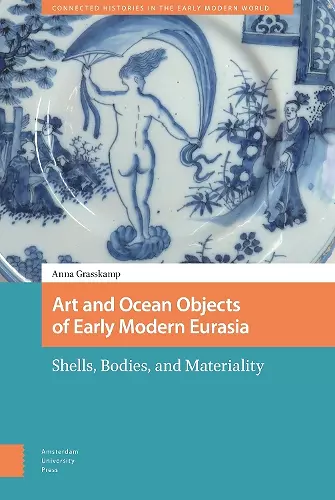Art and Ocean Objects of Early Modern Eurasia
Shells, Bodies, and Materiality
Format:Hardback
Publisher:Amsterdam University Press
Published:21st Nov '21
Should be back in stock very soon

During the early modern period, objects of maritime material culture were removed from their places of origin and traded, collected and displayed worldwide. Focusing on shells and pearls exchanged within local and global networks, this monograph compares and connects Asian, in particular Chinese, and European practices of oceanic exploitation in the framework of a transcultural history of art with an understanding of maritime material culture as gendered. Perceiving the ocean as mother of all things, as womb and birthplace, Chinese and European artists and collectors exoticized and eroticized shells’ shapes and surfaces. Defining China and Europe as spaces entangled with South and Southeast Asian sites of knowledge production, source and supply between 1500 and 1700, the book understands oceanic goods and maritime networks as transcending and subverting territorial and topographical boundaries. It also links the study of globally connected port cities to local ecologies of oceanic exploitation and creative practices.
"This fascinating study is meticulously researched and presented with verve. Anna Grasskamp is a rare scholar who is equally conversant with the European archives and the Chinese ones. Her examination of shells and other maritime organisms as collectible transcultural objects casts new light on these objects, and reveals attitudes towards alien creatures, faraway places, and the natural world that are quite different from modern attitudes."
- Dorothy Ko, Barnard College
“Grasskamp’s exquisitely illustrated study …offers interpretations of individual objects and the Chinese and/or Occidental symbolism associated with them, while at the same time, she tries to embed her findings in larger cultural patterns, variegated forms of local belief, and neglected traditions. … will inspire scholars to explore the story of marine products in new ways; it is a lively contribution to the field of Euro-Asian (art) history and cultural exchange.”
-Roderich Ptak, Ludwig-Maximilians-Universität München, Bulletin of the School of Oriental and African Studies 2023, 86, 2
“Drawing on fields as diverse as art history, object studies, the history of science, and area studies to inform its robust methodology of material culture, the book brings much-needed nuance to the study of the transregional material culture of early modern Europe and China through the maritime world.“
- Kyoungjin Bae, The University of North Carolina at Chapel Hill, CAA Reviews , 2023, June
''… an important contribution to material culture studies and a model for inter- and cross-cultural studies. It is ambitious in tackling such a large subject… Grasskamp moves deftly between literary, philosophical, and religious texts and material and visual culture, weaving a rich and nuanced account, made possible by her comfort working with sources across time, cultures, and languages.”
- Marsely Kehoe, June in West 86th: A Journal of Decorative Arts, Design History, and Material Culture, 2023, 30, 1
''Through her expertise in both Asian and European art history (and languages) [Grasskamp] is able to situate shells at the crossroads of China and Europe as natural objects and material entanglements…”
-Marika Keblusek, Renaissance Quartely', LXXVI, 3,2023
“In "Art and Ocean Objects of Early Modern Eurasia", Anna Grasskamp beautifully shows that the world of the sea was thematically and materially ever-present in the daily lives of early modern people around the globe. Grasskamp reads deftly across European and Chinese sources to elucidate the many complex ambivalences that animated early modern perspectives on the ocean and ocean objects: alluring and threatening, commodified and sacred, and foreign and familiar, to name a few. She excavates an 'inside-out geography' in which the depths of the oceans that connected far-away lands were abundantly rich with materials and meanings that shaped people's views of other places, and of themselves. In doing so, Grasskamp models an art historical methodology for ascribing degrees of agency to a variety of organic matter that indelibly marked modes of (meaning-)making in early modernity … By way of her thorough and impressive research across European and Chinese archives, Grasskamp indubitably proves that seas and oceans can no longer be 'voids' within global art histories. She unearths the ways in which the ocean has shaped our conceptions of the world, of gender, and of art.”
-John White, Princeton University, SEHEPUNKTE 11, 2024
ISBN: 9789463721158
Dimensions: unknown
Weight: unknown
220 pages